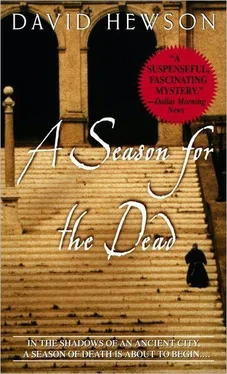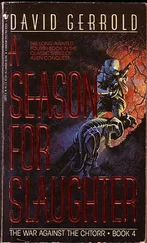David Hewson - A Season for the Dead
Здесь есть возможность читать онлайн «David Hewson - A Season for the Dead» весь текст электронной книги совершенно бесплатно (целиком полную версию без сокращений). В некоторых случаях можно слушать аудио, скачать через торрент в формате fb2 и присутствует краткое содержание. Жанр: Старинная литература, на английском языке. Описание произведения, (предисловие) а так же отзывы посетителей доступны на портале библиотеки ЛибКат.
- Название:A Season for the Dead
- Автор:
- Жанр:
- Год:неизвестен
- ISBN:нет данных
- Рейтинг книги:3 / 5. Голосов: 1
-
Избранное:Добавить в избранное
- Отзывы:
-
Ваша оценка:
- 60
- 1
- 2
- 3
- 4
- 5
A Season for the Dead: краткое содержание, описание и аннотация
Предлагаем к чтению аннотацию, описание, краткое содержание или предисловие (зависит от того, что написал сам автор книги «A Season for the Dead»). Если вы не нашли необходимую информацию о книге — напишите в комментариях, мы постараемся отыскать её.
A Season for the Dead — читать онлайн бесплатно полную книгу (весь текст) целиком
Ниже представлен текст книги, разбитый по страницам. Система сохранения места последней прочитанной страницы, позволяет с удобством читать онлайн бесплатно книгу «A Season for the Dead», без необходимости каждый раз заново искать на чём Вы остановились. Поставьте закладку, и сможете в любой момент перейти на страницу, на которой закончили чтение.
Интервал:
Закладка:
He pointed an accusing finger at Hanrahan. “You told him, you bastard.” The Irishman said nothing. His eyebrows rose a fraction. “You told Fosse about us. You set him against me, thinking that would be a swift end to it. You never guessed what he’d do instead. All these other people, Brendan. Alicia Vaccarini. Valena. Those poor bastards Falcone sent out to watch over him. Don’t you feel the slightest sense of guilt?”
Hanrahan drew himself up in the chair, preparing to go. “You’re rambling again, Michael. All wars have their casualties. The trick is making sure you’re not among them. Do yourself a favor and focus on that.”
Denney rose swiftly from his seat, crossed the room and brought his hands to the Irishman’s throat. Age and agility were not on his side.
Hanrahan was on his feet in an instant, knocking his arms away, standing there ready to fight. He had big fists and they were now half raised. Denney tried to remember who he was, who he still would be in his own head, whatever they did to him.
“Anger’s such a wasteful emotion,” Hanrahan said. “You should have spent more time dealing with yours, Michael, and a little less beneath the sheets.”
“Get the hell out of here,” Denney spat.
“Midday,” Hanrahan continued. “I’ll come to make sure you’re gone. Don’t worry. The press will be elsewhere. You’ll leave in privacy.”
He extended a hand, waited, then withdrew it. “You must place a terribly low value on your life, Michael.”
“What makes you say that?”
“Because I’ve saved it so many times. Here I am saving it again. And not so much as a word of thanks.”
He looked at his watch. They had their arrangements. Michael Denney closed his eyes and prayed for the call.
It was two minutes late but it came.
Forty-Eight
Costa rang the doorbell of the apartment. It was on the fourth floor of a modern block a couple of miles from the airport, just off the main road. You could hear the traffic constantly but it was still better than he’d expected. In the few days he’d known Rossi he’d built up a mental image of what the man was like beyond work: unkempt, disorganized, solitary. He thought he’d be living in some dump closer to town. Instead, here was this neat apartment block with geraniums on the staircases and the smell of home-cooking floating out of the windows of the adjoining homes.
He wished he’d noticed more about the man. Teresa Lupo had seen something else there. His own detachment had prevented his noticing, though he couldn’t help but ask himself whether this was what Rossi really wanted.
A slender middle-aged woman in a plain blue blouse and black skirt came to the door. Her hair was graying and cut severely short. She stared at him through a pair of black-rimmed glasses. He didn’t feel welcome.
“I’m from the station. I was Luca’s partner.”
“Really?”
“I came to say…” She didn’t look as if she’d been crying. If anything, she was full of fury. “… how sorry we all are. We’ll do what we can.”
“Too late for that, isn’t it? Hell, I’m not his sister. Come in.”
She threw open the door and he followed her along a hall decorated with paintings of flowers. It led into a sunny living room. In the corner, seated in a plain wooden chair, was a stocky woman in her early thirties. She was dressed in a nylon housecoat. Her face was pale and flabby, recognizably similar to Rossi’s. She had long black hair flowing down her back and shoulders, like a schoolgirl’s.
The woman looked at him as he entered, opened her mouth and made an unintelligible noise. It sounded like the moan of a wounded animal.
“Nic Costa,” he said, extending a hand. “I worked with Luca.”
She made the noise again, only this time it was more prolonged, more agonized.
“Maria’s deaf and dumb,” the older woman told him. “I’m her care worker. I used to spend time here when Luca couldn’t cope.”
She turned to Maria Rossi and began signing with a quick, ready fluency.
“I didn’t know,” Costa said. “I didn’t even know he had a sister. I can’t believe we never got around to talking about it.”
“Don’t be too hard on yourself,” she replied, and began signing again. The woman in the chair nodded and smiled up at him. “That was Luca for you. I offered your condolences, by the way. I made some small talk.”
“Thanks.” He had no idea what to ask, what to offer. “How bad is she?”
“How bad does deaf and dumb get?” the woman snapped. Then she cursed herself and went to the window for a moment, staring out at the motorway. “I’m sorry. Don’t take it personally. I’ve been working with Maria for five years. Ever since Luca took her out of the home to try and look after her himself. After a while I came to realize you don’t just end up caring for one person. It’s both of them, and lately, to be honest, it was him. He was a complicated man. A good man. Not that it ever made him happy.”
“Why didn’t he tell me? I wouldn’t have let him work all those hours. Last night…” He couldn’t say it. Rossi’s presence in the Piazza Navona had been coincidence. Falcone could have sent any of them on the same job. No one was to blame except the man who killed him.
“What do you think?” she asked. “That he was ashamed of her?”
“No.” That was impossible. “Perhaps in some way he was ashamed of himself, for not being able to make things better. I only got to know him recently. There was something… Luca wasn’t happy inside his own skin. Maybe that’s part of the job.”
She studied him, seeming to approve of his answers, then went over to Maria, sat down next to her, smiling, and put an arm around her shoulders. “I think you’re right. He told me one time he kept waking up in a fury, mad that he couldn’t do anything else for her.”
A flurry of signs brought a brief smile from Rossi’s sister and then half a sob.
“She can’t lip-read. Always found it too difficult. It means it’s easy for me to lie.”
Costa scribbled out his home phone number. “If she needs anything, call me anytime. The department can help with money. There’s a pension. I know it’s no comfort now, but tell me what she needs and I’ll see to it.”
The woman looked at the piece of paper and sighed. “She needs her brother back.”
Costa stiffened. The woman closed her eyes, ashamed of herself.
“I’m sorry,” she said again. “There’s nothing you can do. Maria can’t look after herself. She has to go back in the home. That’s the only place she can get full-time care.”
He understood how Rossi felt.
“It’s okay,” the woman continued. “She has friends there. She used to visit anyway. It’s just…” She had to stop until she could continue. “She’ll miss him. We all will.”
“I know.”
He looked at the small, tidy apartment. There were images of flowers everywhere.
“They’re Maria’s,” she said, noticing his interest. “It’s what she does. She’s deaf and dumb. She’s not stupid. Nor was he.”
Costa walked over and looked at a small oil painting of a single hyacinth bloom: vivid blue hues against a yellow background. She’d seen Van Gogh. The work was full of life and happiness. She’d found something that eluded her brother and had, perhaps, fought to share it with him.
“If you want,” the woman said, “I can show you his room. Perhaps there’s something there you’d like. To remind you of him. A photograph. He had a lot of stuff.”
“I didn’t know him that well. But I know someone who’d appreciate it.”
She led him down the corridor. Rossi’s bedroom was small and looked out of the back onto a car park. The dead smell of stale cigarettes hung in the air. There was a single bed, neatly made, a desk with a few tidied papers, an office diary and a swan-neck lamp. A corkboard on the wall was covered in little yellow notes and photographs. Costa looked at them. They were dates for outings: trips to the sea at Ostia, meetings at the hospital, coach tours into the country. His sister was in every last photograph, on the beach, at a fancy-dress party, eating at a country restaurant, smiling throughout. Luca made her happy. That had been his gift.
Читать дальшеИнтервал:
Закладка:
Похожие книги на «A Season for the Dead»
Представляем Вашему вниманию похожие книги на «A Season for the Dead» списком для выбора. Мы отобрали схожую по названию и смыслу литературу в надежде предоставить читателям больше вариантов отыскать новые, интересные, ещё непрочитанные произведения.
Обсуждение, отзывы о книге «A Season for the Dead» и просто собственные мнения читателей. Оставьте ваши комментарии, напишите, что Вы думаете о произведении, его смысле или главных героях. Укажите что конкретно понравилось, а что нет, и почему Вы так считаете.












